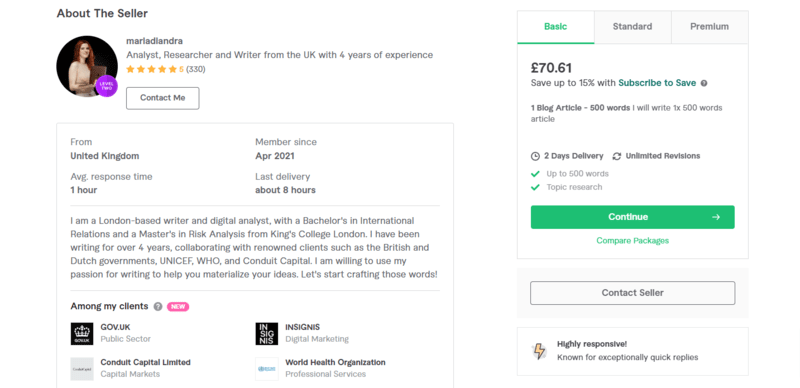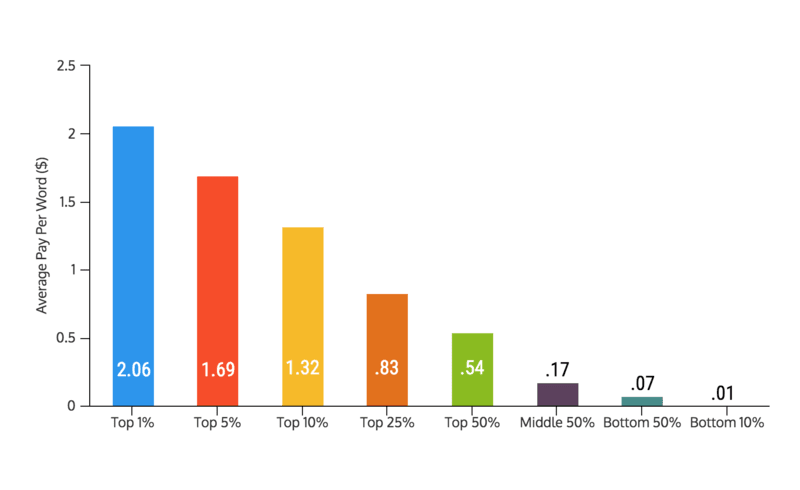
When starting as a freelance writer, understanding your value can be challenging. Even as an experienced writer, it can be difficult to know your worth in line with your skill level and experience. Ultimately, we want to find the right price for each job. We don’t want to charge too high and struggle to get work, but we don’t want to undermine our value and commit to a project below our worth.
As well as understanding your value, you must learn how to price a job. Most writing work you find will charge per word, but no two writing jobs are identical. You may be happy writing a simple SEO blog about car cleaning products for $0.3 per word. In contrast, a newsletter on the complexities of GDPR laws will likely take you far more time to research, fact check, and edit, so the price per word could be $1.30.
As a writer, you must know how to value your time, your minimum rate, and how to price a job.
How valuable is your time?

When considering how to value your time, there are clear criteria to consider:
- Your experience (years as a writer/number of articles written)
- Your portfolio/skill level (the quality of your best work and where it was published)
- Your expenses (where you live and your general living costs)
- Your writing niche (blogs, SEO articles, print articles, copy etc..)
Once you understand where you are in terms of experience and skill level and the niche you will be writing in, you can begin researching typical rates via local job listings or LinkedIn. It’s also possible to use freelance sites such as Fiverr and Freelancer, but these sites can be over-competitive. When searching freelance sites, look for writers from your country/region.
Work out your base rate

You need to know your base hourly rate. This is the minimum rate you will charge, which will help you decide whether to accept a job.
- How much do you need to make per month?
Your expenses will be very personal and depend on your location, family situation etc. Work out your target monthly wage, considering all living costs, taxes, and outgoings. This figure shouldn’t be the bare minimum to keep your lights on, but an amount which pays the bills and offers you some comfort.
- How many hours can you work per month?
How much time do you have to invest in your writing career? If you are working full time, with writing as your only income, you will want to write at least 4-5 days per week or work at least 25 hours per week.
- How much of your work time do you actually spend writing?
How many hours you can work a month and how many hours you can write are two different things. You may have a full day for writing schedules, but after writing all morning, you may feel creatively burned out by midday. You can use burnout time to do your editing, proofing, and formatting work, and also use this time to research and fact-check. But, there will be times when you need writing, and it isn’t flowing as it should.
Once you have the hours you can work per month (e.g. 125 hours), subtract 20% to cover actual writing hours (125 – 20% = 100). Now divide your monthly living costs (e.g. £1,600) by your monthly writing hours (£1,600 / 100 = £16); you now know the minimum you need to earn per hour.
How do you price a job?

Once you know your minimum hourly rate, you must apply this to quotes. As I said, no two writing jobs are the same. You’ll often be given a project with a word count and require a price per word. You may know your minimum rate is £16 per hour, but knowing how long a 1,000-word article will take to write will depend on several factors. It could take anything from 1 hour to 6 hours, depending on the complexity and demands of the work.
Here are the things you need to consider:
- Set up and communication: How much time will you spend discussing the project with the client and learning their needs and way of doing things?
- Research: How much time do you need to research the content and facts?
- SEO: Are there awkward keywords you need to include?
- Formatting and editing: Are there strict formatting guidelines you need to follow?
For some articles, you may spend less than ⅓ of your time prepping, formatting, editing and proofing. But it’s feasible that some projects may demand more time researching than writing.
You also need to watch out for additional tasks the job may include. Some companies may require you to source images for the article, which need to be relevant, license-free, and correctly linked. You may also be required to add quotes and format these correctly. Some companies may even ask you to enter your article into their WordPress site and complete the SEO metadata. These tasks soon add up, so it’s essential to have all the details laid out and considered before pricing.
Things to note:
Always factor in more time than you expect, especially when working with a new client.
Set a time limit for projects, especially smaller ones. You should set a maximum amount of time for your prep work.
Pricing example
Someone asks you to write 5 x 600 word SEO blogs on sunglasses. The blogs are ‘top 5 lists’; each has a title, a keyword phrase you must use three times, and links to the products and info you must include.
On talking to the client further, they ask that you add three license-free images per article, which you must source. They also ask that you post the article via their WordPress admin and fill in the basic SEO details, including the meta title.
Per article:
- 40 mins researching
- 70 mins writing
- 20 mins editing
- 10 mins to source images
- 10 mins to upload and fill in SEO
Total 2.5 hours per article
At £16 per hour = £40
40 / 600 = £0.07 per word. (rounded up form 0.066)
Total price quote = £0.07 per word, (x600) £42 per article, or (x5) £210 for the project.
This pricing is just a rough example and a guideline. It will take some time to work out your target rates and be able to value a job, but this will hopefully highlight the many things you have to factor in.




